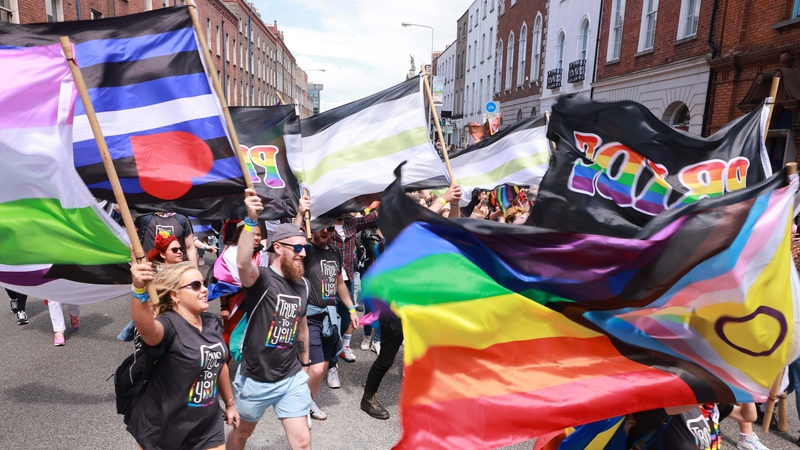
Ireland’s young LGBTQI+ population are experiencing significant mental health challenges according to research by Trinity College Dublin.
The findings show that that mental health and wellbeing have declined amongst the LGBTQI+ population since 2016.
‘Being LGBTQI+ in Ireland’ highlights “significant challenges” experienced by younger age groups and the transgender and gender non-conforming communities.
The research which involved 2,800 participants in association with the Belong To charity, was broken into age groups.
Of the 631 participants who were aged between 14 and 18, 50% experienced severe or extremely severe symptoms of depression, 66% experienced severe/extremely severe symptoms of anxiety, 41% experienced severe/extremely severe symptoms of stress, 59% had a possible eating disorder, 72% had self-harmed, 77% reported suicidal thoughts and 33% had attempted to take their own life.
When it came to 560 slightly older participants aged between 19 and 25 years, 35% experienced severe/extremely severe symptoms of depression, 47% experienced severe/extremely severe symptoms of anxiety, 29% experienced severe/extremely severe symptoms of stress, 47% had a possible eating disorder, 65% had self-harmed, 75% reported suicidal thoughts and 33% attempted to take their own life.
Mental health challenges were highest among the transgender and gender non-conforming community – 44% experienced severe/extremely severe symptoms of depression, 55% experienced severe/extremely severe symptoms of anxiety, 35% experienced severe/extremely severe symptoms of stress, 50% had a possible eating disorder, 75% had self-harmed, 82% reported suicidal thoughts and 39% attempted to take their own life.
However, in response to the mental health challenges facing them, 60% of participants had sought professional help for a mental health problem in the past five years.
Although the study found a positive change in public attitudes towards LGB people since a previous study conducted by TCD in 2016, members of the public who were surveyed had less favourable attitudes towards the transgender and intersex communities.
People who reported more knowledge and more frequent interaction with transgender and intersex people were significantly more likely to have positive attitudes.
The report has highlighted the important and critical role LGBTQI+ community groups and support networks (family, friends, peers, work colleagues) play in supporting positive mental health among the community.
84% of participants felt that having a connection with the LGBTQI+ community had a positive impact on their mental health, with 93% of participants rating making LGBTQI+ friends as also having a positive impact.
Belong To CEO Moninne Griffith has described the findings of ‘Being LGBTQI+ in Ireland’ are disheartening and upsetting, but not surprising to those supporting the community.
She said a sense of complacency had crept into Irish society because there was a perception that once marriage equality was achieved and Pride had become a central calendar highlight for the country – the struggles of LGBTQI+ people had disappeared.
“This study demonstrates the harsh reality that the opposite is true – depression, anxiety and stress have increased amongst the community, and respondents have reported increases in witnessing bullying in schools, and more young people are considering leaving school early as a result of the treatment they receive,” Ms Griffith said.
“These upsetting findings should serve as a rallying cry to the Government, policymakers and allies to work with us to end anti-LGBTQI+ stigma and discrimination, and create a society where the LGBTQI+ community can feel safe and supported.”
Professor in Mental Health at Trinity College Dublin, Professor Agnes Higgins who led the research team, said the findings continued to highlight that a significant proportion of those under 25 years of age are struggling with their mental health, self-reporting high levels of self-harm, suicidal behaviour, symptoms of possible eating disorders and symptoms of severe and extremely severe stress, anxiety and depression.
She said that for LGBTQI+ adolescents, school continues to be a challenging place, with many experiencing or witnessing homophobic, transphobic, or biphobic bullying.
“Bullying not only negatively impacted on young people’s desire to leave school early, but those who experienced LGBTQI+ related bullying in school, had poorer wellbeing and mental health outcomes in comparison to those who had not experienced LGBTQI+ related bullying,” Ms Higgins said
“For many transgender and gender non-conforming participants, the school environment was particularly challenging in terms of expressing one’s gender identity.”
Source link
 TG4 TV PC to TV
TG4 TV PC to TV
